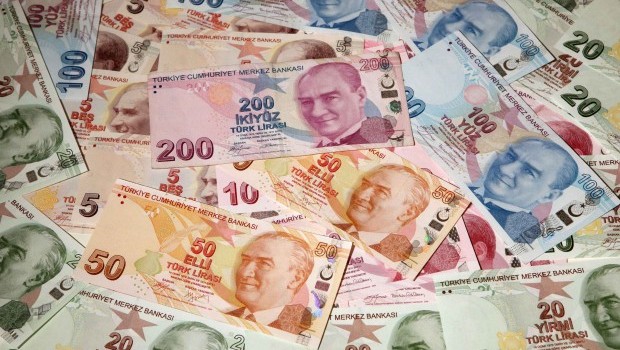
Turkish lira banknotes are seen in this file photo taken in Istanbul on October 18, 2011. (REUTERS/Murad Sezer/File)
Istanbul, Reuters—Turkey’s lira fell to record lows on Friday rattled by domestic political tensions and the US Federal Reserve’s decision to start trimming its monetary stimulus program, prompting the Turkish central bank to threaten more market action.
Already hammered this year by expectations that the Fed would begin to stem a flood of dollars that has boosted global emerging markets, the bank has sold dollars regularly to prop up the lira and stop domestic inflation from getting out of hand.
A row at the top of Turkish society that has seen dozens of senior businessmen, officials and policemen detained this week has only added to the bank’s headaches.
On Friday it increased its forex auction to 400 million US dollars from 50 million after saying it could sell as much as 10 times the announced minimum amount on days of excessive volatility.
The actions had little immediate lira impact but analysts said chances were it might follow that threat with direct intervention in markets next week.
“While the lira’s level and volatility increases, the possibility for the central bank to intervene directly with forex sales on top of holding forex selling auctions also rises,” said Ali Çakiroglu, a strategist at HSBC Portfolio.
“Turkey-specific developments will determine whether the lira will negatively decouple in the coming period. In a quiet Christmas week, the bank may intervene directly.”
The bank has sold a minimum of between 50 and 100 million US dollars at regular auctions this year, while also stemming domestic banking liquidity, to try to stabilize the lira in lieu of raising official interest rates.
Policymakers’ message that they will not raise interest rates to support the lira also speaks for it intervening first. It last did so at the start of 2012.
“After we reached those [today’s] levels in the lira, intervention possibility is high because we reached the limits of the tightening which can be done with the current interest rate corridor,” said Is Investment strategist Uğur Küçük.
Some analysts believe the central bank may not have enough firepower to combat sustained pressure on the lira.
“The big picture is Turkey doesn’t have enough reserves to spend on defending the currency,” said Manik Narain, emerging markets strategist at UBS in London.
Shortfall
Turkey’s need to import almost all of the oil it uses gives it one of the world’s biggest current account shortfalls, making it dependent on inflows of investment and more exposed to any tightening of the supply of cash globally.
Its central bank, whose policy has been heavily influenced by the Fed this year, kept interest rates on hold on Tuesday but moved to tighten liquidity sharply as it worried about the impact of the withdrawal of US monetary stimulus.
It said interbank money market rates would be close to 7.75 percent and the weighted average cost of funding will be at 6.75 percent or above in the forthcoming period.
A corruption probe, termed by Prime Minister Recep Tayyip Erdoğan a “dirty operation” to tarnish the government, has seen 50 people, including three cabinet ministers’ sons, prominent businessmen and local government officials detained this week.
Dozens of senior Turkish police officers have since been removed from duty accused of abuse of office for keeping the investigation quiet from higher level officials in security institutions. Late on Friday, further dismissals were still being reported.
The events are seen widely as a symptom of a power struggle between Erdoğan’s ruling Justice and Development Party (AKP) and US-based cleric Fethullah Gülen, who wields influence in the police and judiciary.
“These developments further point towards a genesis in AKP-Gülen conflict rather than any specific corruption issue which can be resolved easily,” a note from Commerzbank said.
“Such turmoil could intensify in other areas too leading up to the March [local] elections.”
Turkish debt insurance costs surged to 14-week highs of Friday and the lira touched an all-time low of 2.0983 against the dollar, compared to 2.0780 late on Thursday. It stood at 2.0895 by 3:35 pm GMT.
The main stock index closed up 0.66 percent after sustaining heavy losses on Tuesday and Thursday. The yield on Turkey’s benchmark 10-year bond ended the day at 10.09 percent, after earlier touching three-month highs of 10.19 percent.
